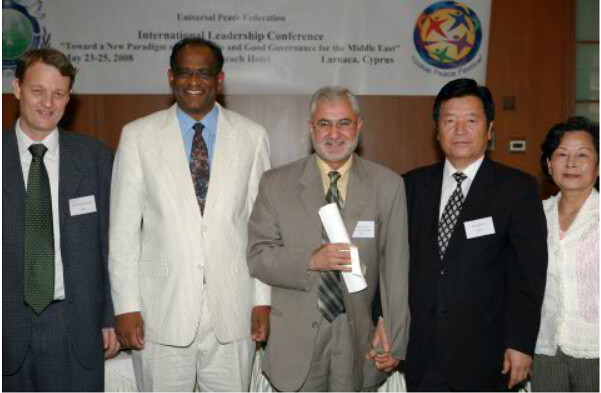The Universal Peace Federation convened its first International Leadership Conference (ILC) for the Middle East region on the Mediterranean island of Cyprus May 23-25, 2008. Forty Ambassadors for Peace – new and old – gathered from 11 nations in the region for a special program that combined UPF presentations with active involvement through panel discussions and breakout sessions.
Planned for more than three months as a starting point for more effective regional collaboration among the Middle East network of Ambassadors for Peace, the conference coincided with a breakthrough in Arab mediation efforts to enhance regional stability. A crisis that had brought Lebanon’s opposing groups to blows and street fighting in mid-May was defused through a May 21 agreement reached with the help of the Arab League and the Qatari government, which hosted negotiations to overcome the crisis.
This made the presence of a large delegation from Lebanon at the ILC especially stimulating, in particular as the event gave the Lebanese Ambassadors for Peace an opportunity to express their gratitude to a Qatari participant in the wake of her nation’s ground-breaking intervention in Lebanon. The fortuitous timing of the conference meant that the Lebanese traveled home in the knowledge that they had a new president, at long last!
Right from the start, the Cyprus ILC was characterized by a congenial mindset and will to overcome old misgivings. Vice President of UPF's Global Peace Council, Taj Hamad, well-known in the region, arrived from New York as the main presenter, highlighting recent UPF developments in other parts of the world. The opening and closing sessions featured substantial and effective addresses by the regional chair, Dr. Sang Jin Lee, whose vision it was to call together this conference at this time. Participants included parliamentarians, religious leaders, human rights activists, retired generals, school and university educators, lawyers, publishers, psychologists, and sports and business professionals. The island of Cyprus, west of Lebanon, was an accessible location for participants throughout the region.
The panel discussion on “The Contribution of Religions to Peace in the Middle East” included Jewish, Maronite Christian, Orthodox Christian, Muslim, and Druze speakers. The later round table on “The Family as a Paradigm of Leadership” brought together a representative of the Jordanian National Forum for Women, a professor of Shariah law at Damascus University, an Israeli woman active in promoting business leadership for women, a family therapist from Qatar, and a professor of humanities from Lebanon.
Panel speakers emphasized that the number of extremists in every religion is small but that economic pressures and experiences of oppression can radicalize people. Religions need to struggle to overcome claims to be the sole owners of truth, and religious leaders need to gain “education outside their books,” panelists emphasized.
“Why does humanity believe in God? There is a reason: because only God’s word can unite all the tribes of the world,” one speaker said. “For us Christians, peace and the Lord is equal,” added a priest. “Everyone who works for peace is a Christian for me.”
A second panel discussion addressed the issue of the family as paradigm of leadership, with speakers delving into the many challenges that families face today in such diverse settings as Israel, Qatar, and Iraq. The discussion was preceded by UPF lecture presentations on the root cause of conflict and the role of the family.
Also on the second day of the ILC, a presentation on character education led directly to a breakout session in which participants shared their detailed views on UPF’s five principles for Ambassadors for Peace in a setting that was well suited for interaction among all the participants. After the mental investment of the full day of conferencing, a short trip to Larnaca, a resort town on the southern coast of the island, and a relaxed dinner on a boat in Larnaca Bay strengthened the bonds between us on our second evening.
The third day of deliberations was dedicated to practical aspects of UPF and the work of Ambassadors for Peace. A member of parliament from Oman, a first-time participant, extolled the contributions to peace by Arab leaders.
Nine participants made short statements highlighting the overall satisfaction with this leadership conference, calling among other things for the establishment of a regional peace academy. Some appreciated the opportunity to deepen their knowledge of UPF’s principles of peace and its broad scope of activities. Others mentioned that the atmosphere created at such conferences is a major factor in transforming the culture of conflict – which has been so prevalent in this region – into a culture of peace. Indeed, where the academic word would not reach, participants also shared their peace visions through songs.
Dr. Lee stated in his concluding remarks that there cannot be peace in the world without peace in the Middle East, where conflicts between Israel and Palestine and religious conflicts have been a burden for a long time. “Our problems need to be solved by people of the Middle East. We should meet often, discuss, and make an effort to understand each other,” he said.
Perhaps the following quotations can best convey the spirit of our discussions. In response to a question about including atheists in UPF’s vision of “One Family under God,” one presenter related a discussion (in his homeland) in which the other eventually announced: “Well, I’m happy to support “One Family under the Sky.” One Ambassador for Peace stated: “I will consider myself a real Ambassador for Peace when I can fully represent the needs of my enemy.” One Muslim participant, in response to several comments about the lack of family values in “the West,” remarked: “I don’t see it like that. I believe family values are respected all over the world, and that’s what I want to tell my children. There are numerous examples of Western societies rejecting the immoral behavior of their leaders. I believe we have more in common than we think. I look for the unity of civilization – for one family under God.”

